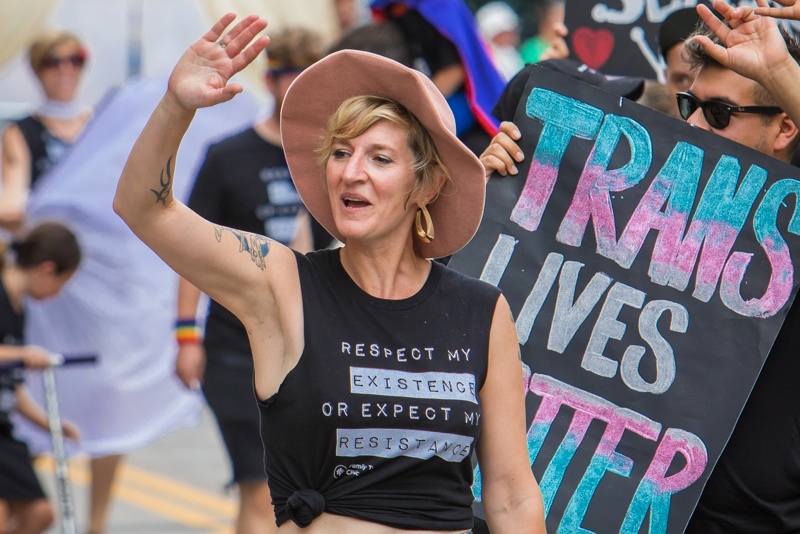Family Tree Clinic

Alissa Light believes deeply that the solutions for our health care crisis exist within our communities. Alissa has been the executive director of Family Tree Clinic since 2010, but her relationship with the clinic goes back the 90s, when she herself was a patient at Family Tree. Since stepping into her current leadership role, she worked with the staff and board to right-size the community-based health clinic through an economic recession, shift its business model to be more responsive to unmet community needs and an evolving health care system, and transform it into a beacon of LBGTQ health care in the Upper Midwest. Today, Family Tree Clinic continues to listen to the needs of its community to fulfill its mission of cultivating a healthy community through comprehensive sexual health care and education.
“What we hear from patients are statements like: ‘I feel joy when I come into this clinic,’ ‘I look forward to and celebrate the opportunity to come in and get care at Family Tree Clinic,’ and ‘I feel safe, seen, and heard.’”
Alissa Light, Executive Director, Family Tree Clinic
A Healthier Health Care Experience

Family Tree Clinic staff understand that patients’ experience within the health care system is a health outcome indicator itself. “We’ve heard from patients that while medical expertise and technical skills of the provider are necessary, what really impacts patients’ experience of health and well-being is the relationship to the health care delivery overall and the experience of each point along the way,” said Alissa. With this data in mind, Family Tree Clinic focuses on the little things that can have a profound difference in how much ownership we feel over our health. Front desk staff and intake specialists are trained to work with folks who have historically been marginalized, erased from, or even traumatized, by the health care system. It practices radical transparency and advocacy when it comes to the cost of health care, and in nearly 40 years has never turned a patient away for not being able to pay. Even the art on the walls is representative of the community the clinic serves.
Family Tree Clinic is also leading the way in bigger changes in health care delivery. It draws people from the 7-state Upper Midwest region for its leadership in LGBTQ care and trans-affirming gynecological care and hormone care. It partners with legal volunteers to help trans people navigate name and gender marker changes. It steps outside of its clinic walls to provide 12,000 Minnesotans annually with dynamic and comprehensive sexual health education, from pre-teens to adults. It has a long-standing commitment to working with the Deaf/DeafBlind community, educating its staff and board on how to create a safe and welcoming space.

The result: “What we hear from patients are statements like: ‘I feel joy when I come into this clinic,’ ‘I look forward to and celebrate the opportunity to come in and get care at Family Tree Clinic,’ and ‘I feel safe, seen, and heard,’” said Alissa. More concretely, for the clinic’s trans and non-binary patients, access to health care that affirms and supports their identities has led to more consistent preventative care practices and visits. “We’re seeing 70% increase in access to basic preventative health care and a significant reduction in suicidal ideation.”
A Beacon of LGBTQ Health Care in the Midwest

A decade after the economic recession and after a lot of community listening and program growth, Family Tree Clinic is moving to a new home, which will increase its visibility, accessibility, and usability. It owns the building it’s currently in, but only uses 30% of the space, renting out the other 70% to other nonprofits and social enterprises. “We’ve been pretzeling ourselves in an old, gorgeous elementary school building for 37 years now,” said Alissa. “After doing an assessment to see what it would take to manifest this next phase of growth for Family Tree and to truly be seen as a beacon of health care, the cost/benefit to selling the building and leveraging the good stewards we’ve been made so much sense.” A new space will also allow it to modernize its delivery of health care and incorporate better technology.
Family Tree Clinic also assessed its relevancy to the St. Paul neighborhood it’s been in for nearly four decades, which has undergone changes itself. “We’ve got this incredible origin of being started by community activists in this immediate neighborhood to meet an immediate neighborhood need,” said Alissa. “We felt like we really want to hold both the power and impact of being invested in a community that has need, and be a destination center for the Greater Metro and the Upper Midwest.” It has identified a neighborhood and zip code in Minneapolis that is not only the second highest-largest growth zip code for its current patients, but which also has a significant unmet health care need.
Family Tree Clinic worked with Propel Nonprofits on a loan for the purchase of its new facility, the location of which will be announced this summer. For Alissa, the investment in Family Tree’s space shows its enduring commitment to the people it serves and for ongoing health equity. “People need us to show up, to do better, to be really open and accountable, and to keep recommitting to our communities,” she affirmed. “That’s what this work is all about.”
To learn more about Family Tree Clinic, visit its website. The clinic is open to all, and as Alissa said: “If you’re on a workplace sponsored plan or have good coverage, using Family Tree for your health care is a way to vote with your good health insurance to choose a community clinic like Family Tree.”

Photos provided by Family Tree Clinic
